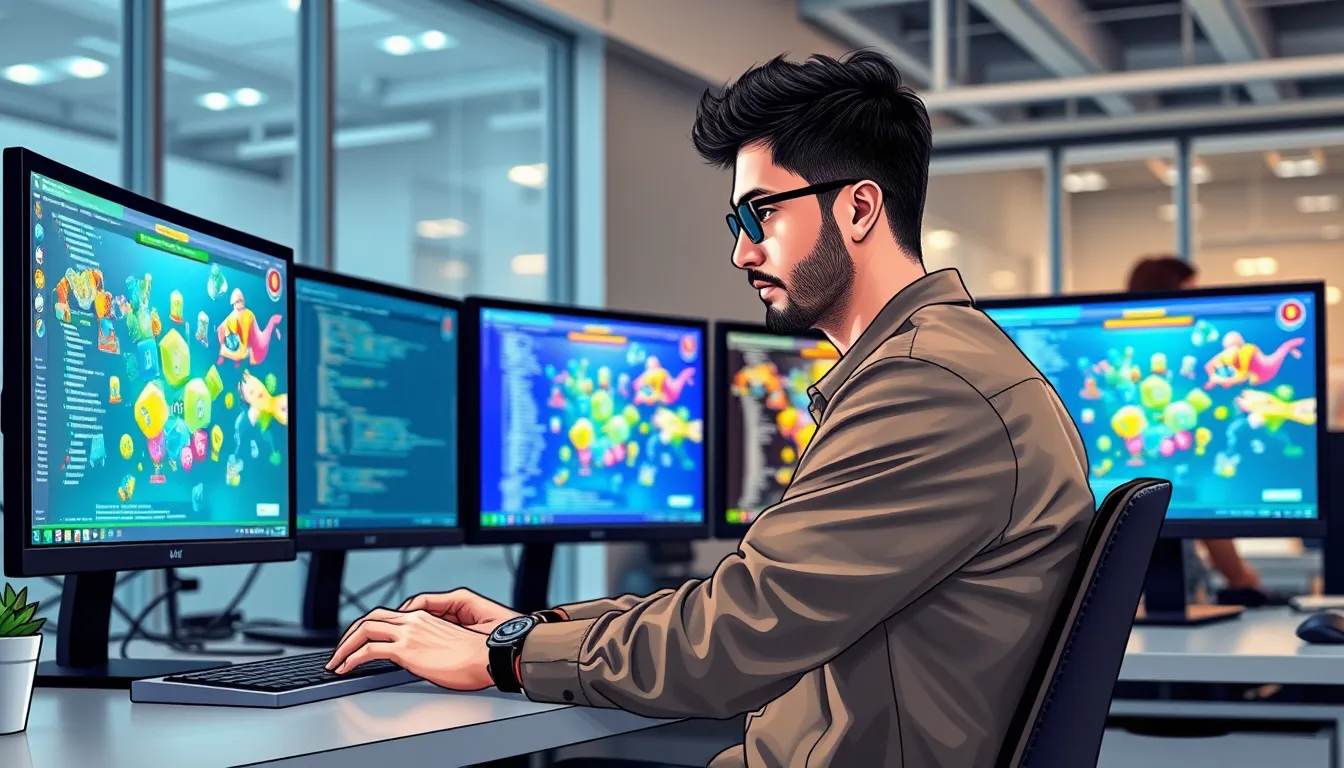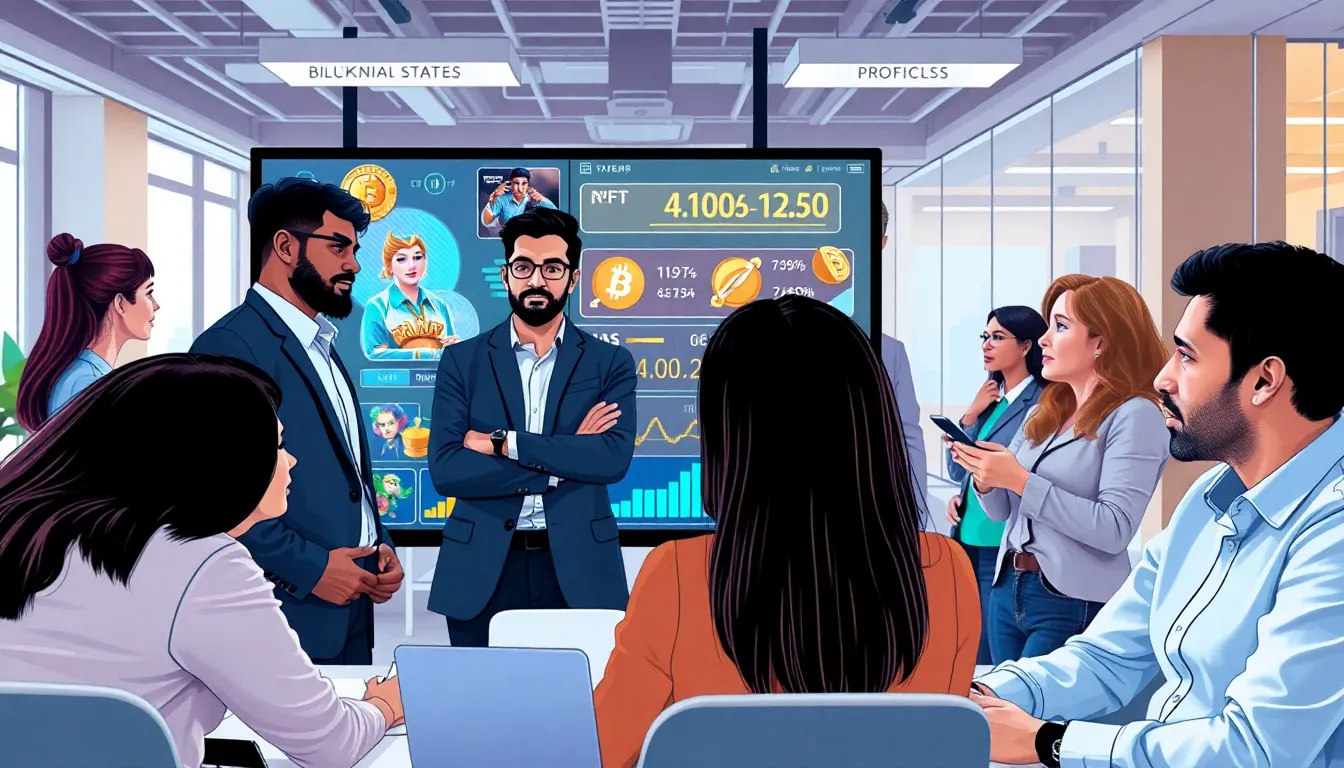Physical Address
304 North Cardinal St.
Dorchester Center, MA 02124
Physical Address
304 North Cardinal St.
Dorchester Center, MA 02124

In a world where digital treasures reign supreme, NFT gaming platforms are the new playgrounds for gamers and investors alike. Imagine diving into a universe where every sword, character, and collectible is a unique masterpiece, all thanks to the magic of blockchain technology. It’s like having a virtual treasure chest that never runs out of surprises!
But developing these captivating platforms isn’t just a walk in the park. It takes a skilled NFT gaming platform development company to turn wild ideas into pixelated realities. With the right expertise, they can help transform a simple game into a thriving ecosystem where players can trade, earn, and even brag about their rare finds. So, if you’re ready to level up your gaming experience, it’s time to explore the world of NFT gaming development! Get ready to unlock the fun and fortune waiting just around the digital corner.
NFT gaming platforms emerge as innovative ecosystems, combining gaming experiences with blockchain technology. They elevate in-game assets as unique, tradable items, attracting both gamers and investors.
NFT gaming platforms play a vital role in the gaming industry. They transform traditional gaming by allowing players ownership of in-game items. Ownership fosters a sense of investment, leading to increased player engagement. The potential for revenue generation through trading assets adds another layer of excitement, appealing to both casual and competitive players. Statistics show that NFT games generated over $4 billion in sales within the first quarter of 2022. This growth proves there’s strong demand and interest in these digital collectibles and experiences.
Key features distinguish NFT gaming platforms from standard games. Blockchain technology ensures transparency in ownership, making every transaction verifiable. Interoperability allows players to use their assets across different games, enhancing their utility. Additionally, smart contracts automate transactions, eliminating the need for intermediaries. Players often access unique experiences, ranging from play-to-earn models to exclusive in-game events. Engaging communities around these platforms increases social interaction, fostering an environment where players can collaborate or compete.

Selecting an NFT gaming platform development company requires careful consideration of various factors that impact project success.
Firstly, evaluate the company’s expertise in blockchain technology and gaming. A strong background ensures effective integration of smart contracts and secure transactions. Next, consider the company’s portfolio. Assessing past projects provides insight into their design capabilities and experience with similar platforms. Additionally, look for customization options. Flexibility in creating unique features can enhance user experience. Communication and support also play a crucial role; a responsive team facilitates smoother development processes. Lastly, analyze pricing structures. Competitive pricing without compromising quality is essential for budget management.
Several companies stand out in the NFT gaming platform development sector. One highly regarded option is Enjin, known for its extensive experience in blockchain gaming. Another prominent name is Dapper Labs, famed for creating the popular NBA Top Shot. Immutable X has gained popularity by offering gas-free transactions, leveraging Ethereum’s security. Beyond these, Zilliqa brings innovative solutions to NFT gaming with its unique approach. Examining these firms helps identify suitable partners for your NFT gaming project.
The development process for NFT gaming platforms consists of several key stages. Each stage plays a vital role in ensuring a successful launch and engaging user experience.
Initial planning and conceptualization set the foundation for the project. Developers assess market trends and user preferences to shape the concept. Comprehensive research identifies unique selling points to differentiate the game. Defining the target audience increases the chances of successful engagement. A clear roadmap outlining the features, artwork, and technology stack guides the development team throughout the project.
Design and user experience focus on creating an engaging interface. Developers prioritize accessibility to ensure players of all backgrounds can enjoy the game. Visual elements must capture the game’s theme while maintaining intuitive navigation. User feedback greatly influences design iterations, fostering improvements that enhance player enjoyment. A seamless experience motivates users to explore in-game features, driving community interaction and retention.
Smart contracts and blockchain integration form the backbone of NFT gaming platforms. Developers utilize smart contracts to automate transactions and ensure transparent ownership of in-game assets. Selecting the right blockchain technology is crucial; compatibility affects asset interoperability. High scalability accommodates growing user bases and transaction volumes. Robust security measures safeguard users, building trust in the platform and its assets.
Testing and launch comprise final stages in the development process. Thorough testing ensures functionality, identifying bugs and performance issues before release. Multiple testing phases evaluate user experience, smart contracts, and overall system reliability. A phased launch strategy can mitigate risks, allowing developers to gather user feedback and make necessary adjustments. Successful launches often create buzz in the gaming community, encouraging early adoption and enhancing longevity.
NFT gaming continues to evolve, showcasing emerging trends that reshape the landscape. Innovations in game mechanics and expanding user bases lead the way in this burgeoning sector.
NFT gaming platforms introduce groundbreaking mechanics, enhancing gameplay and player engagement. Players enjoy play-to-earn models, allowing them to earn cryptocurrency or NFTs through participation. Unique features like staking and yield farming also attract users, providing them with passive income opportunities. Moreover, gamification elements encourage competition and collaboration within the community. Enhanced user experiences emerge through virtual reality and augmented reality integrations, offering immersive environments that captivate players. Developers increasingly prioritize innovative mechanics to keep the gaming experience fresh and exciting.
Growing interest in NFT gaming platforms drives a wider user base, appealing to diverse demographics. Developers recognize the importance of accessibility, ensuring platforms cater to both casual and hardcore gamers. By implementing user-friendly interfaces and tutorials, they lower entry barriers for newcomers. Social media engagement boosts visibility, inviting non-gamers to explore NFT gaming possibilities. Additionally, partnerships with popular gaming franchises capture the attention of established audiences. Community-building initiatives foster connections among players, strengthening overall engagement. Strategies emphasize inclusivity and outreach to successfully attract a broader audience.
The NFT gaming landscape is rapidly evolving and presents exciting opportunities for both developers and players. As these platforms continue to redefine the gaming experience through unique ownership and innovative mechanics, the demand for skilled NFT gaming development companies will only grow.
Choosing the right partner is crucial for success in this competitive market. By focusing on expertise in blockchain technology and a strong portfolio, businesses can position themselves to capitalize on the potential of NFT gaming.
With the right development team, companies can create engaging platforms that not only attract players but also foster vibrant communities. The future of gaming is here, and it’s time to embrace the possibilities that NFT technology brings.